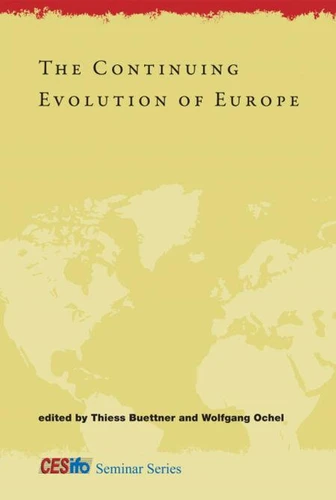The Continuing Evolution of Europe
Par : ,Formats :
Disponible dans votre compte client Decitre ou Furet du Nord dès validation de votre commande. Le format ePub protégé est :
- Compatible avec une lecture sur My Vivlio (smartphone, tablette, ordinateur)
- Compatible avec une lecture sur liseuses Vivlio
- Pour les liseuses autres que Vivlio, vous devez utiliser le logiciel Adobe Digital Edition. Non compatible avec la lecture sur les liseuses Kindle, Remarkable et Sony
- Non compatible avec un achat hors France métropolitaine
 , qui est-ce ?
, qui est-ce ?Notre partenaire de plateforme de lecture numérique où vous retrouverez l'ensemble de vos ebooks gratuitement
Pour en savoir plus sur nos ebooks, consultez notre aide en ligne ici
- Nombre de pages184
- FormatePub
- ISBN978-0-262-30069-8
- EAN9780262300698
- Date de parution16/12/2011
- Protection num.Adobe DRM
- Taille1 Mo
- Infos supplémentairesepub
- ÉditeurThe MIT Press
Résumé
Economists address key challenges facing the EU, including financial instability, welfare state reform, inadequate institutional framework, and global economic integration. The European Union began with efforts in the Cold War era to foster economic integration among a few Western European countries. Today's EU constitutes an upper tier of government that affects almost every level of policymaking in each of its twenty-seven member states.
The recent financial and economic crises have tested this still-evolving institutional framework, and this book surveys key economic challenges faced by the EU. Prominent European economists examine such topics as the stability of the financial markets and possible policy options to reduce future vulnerability to crises, including Glass-Steagull-style narrow banking; the effect of emerging economies such as China and India on Europe's economic position; the protection of national interests in industrial policy; reforming and preserving the welfare state in the face of unemployment, population aging, and worker mobility within the EU; and improving the EU's institutional framework by reassigning responsibilities among supranational, national, and local governments.
Among the conclusions that emerge from these analyses are the necessity for banking regulation as well as budgetary discipline; the need to consider global as well as European integration; and the idea that an environment that fosters internal competition will increase Europe's competitiveness internationally.
The recent financial and economic crises have tested this still-evolving institutional framework, and this book surveys key economic challenges faced by the EU. Prominent European economists examine such topics as the stability of the financial markets and possible policy options to reduce future vulnerability to crises, including Glass-Steagull-style narrow banking; the effect of emerging economies such as China and India on Europe's economic position; the protection of national interests in industrial policy; reforming and preserving the welfare state in the face of unemployment, population aging, and worker mobility within the EU; and improving the EU's institutional framework by reassigning responsibilities among supranational, national, and local governments.
Among the conclusions that emerge from these analyses are the necessity for banking regulation as well as budgetary discipline; the need to consider global as well as European integration; and the idea that an environment that fosters internal competition will increase Europe's competitiveness internationally.
Economists address key challenges facing the EU, including financial instability, welfare state reform, inadequate institutional framework, and global economic integration. The European Union began with efforts in the Cold War era to foster economic integration among a few Western European countries. Today's EU constitutes an upper tier of government that affects almost every level of policymaking in each of its twenty-seven member states.
The recent financial and economic crises have tested this still-evolving institutional framework, and this book surveys key economic challenges faced by the EU. Prominent European economists examine such topics as the stability of the financial markets and possible policy options to reduce future vulnerability to crises, including Glass-Steagull-style narrow banking; the effect of emerging economies such as China and India on Europe's economic position; the protection of national interests in industrial policy; reforming and preserving the welfare state in the face of unemployment, population aging, and worker mobility within the EU; and improving the EU's institutional framework by reassigning responsibilities among supranational, national, and local governments.
Among the conclusions that emerge from these analyses are the necessity for banking regulation as well as budgetary discipline; the need to consider global as well as European integration; and the idea that an environment that fosters internal competition will increase Europe's competitiveness internationally.
The recent financial and economic crises have tested this still-evolving institutional framework, and this book surveys key economic challenges faced by the EU. Prominent European economists examine such topics as the stability of the financial markets and possible policy options to reduce future vulnerability to crises, including Glass-Steagull-style narrow banking; the effect of emerging economies such as China and India on Europe's economic position; the protection of national interests in industrial policy; reforming and preserving the welfare state in the face of unemployment, population aging, and worker mobility within the EU; and improving the EU's institutional framework by reassigning responsibilities among supranational, national, and local governments.
Among the conclusions that emerge from these analyses are the necessity for banking regulation as well as budgetary discipline; the need to consider global as well as European integration; and the idea that an environment that fosters internal competition will increase Europe's competitiveness internationally.



